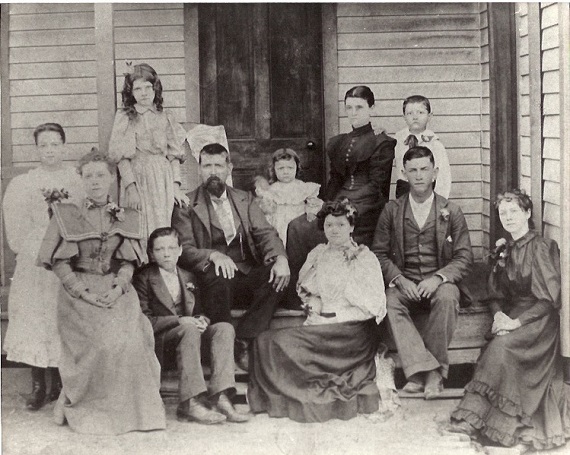
Lack of attachment to culture, heritage, and tradition is the death of a nation.
As a child, I had very little in-depth knowledge of my family’s history. Most of my extended family had died from old age by the time of my birth except for my maternal grandfather, Nelson Pace and great aunt, Mary Paul Pittman Smyrl, both natives of Alabama and born in 1907 and 1899 respectfully. We were a rather small group and my attachments to my parents, siblings, grandfather, and great aunt were meaningful. These are the people who instilled in me the value of family, respect, and honor.
Unfortunately, little was known about many of my ancestors. My great aunt had collected information on our family during the 1950s and she knew that our ancestors settled in Alabama during the first half of the 19th century. Even less was known about my father’s heritage. We were aware that they were, like my father, from Appalachia. I only knew that my great-great-grandfather, Thomas Williams had enlisted in the Confederate army and was a native of North Carolina.
Almost a decade ago I began to investigate my family’s history, and to say what I would find would change my outlook would be an understatement. The first of my ancestors in America were Richard and Isabella Pace of Wapping England arrived in Jamestown in 1611, and my last, Samuel Cathcart arrived on in Charleston in 1767 from Ulster. Moreover, I discovered that my ancestry was from the British Isles. At least twenty-five of these ancestors were Patriot Whigs in the Southern Campaign of the American Revolution, and at least seven participated in the Battle of King’s Mountain in 1780; five fought in the War for Southern Independence. I am a lineal descendant of William Finley and Rebecca Caldwell, maternal grandparents to John C. Calhoun. Even my aforementioned great-great-grandfather, Thomas Williams of the 62nd North Carolina, Company D spent two years at the Union prison, Camp Douglas and who was himself a descendant of North Carolina Regulator James Williams. In addition, when I speak with other Southerners who have an in-depth knowledge of their ancestry, it is common to find that we share one or more common ancestors. The South is, in many cases, an extended family.
My family’s heritage was known about and cherished for hundreds of years in the period before World War II, documented in family bibles and passed down through memorable family stories. Yet, the massive displacement of people during the Great Depression, World War II and the post-war economic boom caused much of this knowledge to be forgotten, or lost during the rise of modernity.
Nonetheless, I had the joy of experiencing a bit of my family’s tradition, heritage and sense of place. There were always hints of who came before, pictures of people I did not know, holidays in northern Alabama, and family reunions in the Betty’s Creek valley in the Blue Ridge. This imparted within me a sense that I am but a part of a much larger narrative but finding more about that story was always beyond my reach. As a child, I often remember taught in school the romantic narrative of immigration to Ellis Island, or how the American Revolution was fought and won in the North. These made me fear that my home, my state, myself, were without a history and heritage worthy of discussion.
Uncovering that my ancestors, like many Southerners, settled America during the colonial era of the 17th and 18th centuries was a revelation. These ancestors were part of the settlement of the Tidewater region of Virginia, the French and Indian War, Bacon’s Rebellion, the first settlers in Maryland, the North Carolina Regulator War, and the entirety of the Southern Campaign for American Independence. None of these events were taught in history courses in my high school or at university. The conquest of the South by the North, along with modernity itself has attempted to wipe away Southern heritage, and by extension the South as a nation within the greater United States.
We, in the South, have allowed our birthright to be forgotten, demolished, and tossed aside in the pursuit of materialism in a post-industrial economy. We know that something has been lost; you see it in the adverts for DNA testing, for heritage clothing brands, and in the revival of traditional craftsmanship. Evidence surrounds us that the promise of consumer culture and the rise of technology has left an entire generation of Americans feeling that they have no purpose, lonely, disconnected from society and no stake the places in which they live.
I have taken upon myself the role as family historian so that the names of Samuel Pitman, Richard Pace, Robert Ballew, James Richey, Rebecca Caldwell, Jesse Burnett, Edward Williams, Samuel Levi Young, William Gragg, Philip Null, Samuel Hand, along with many others will never be forgotten. These are but a sample of the people who gifted us the pleasures of the present, and for who we owe a debt of gratitude that cannot be repaid.
Resurrecting my heritage has led me to view my connection to the Republic, my cultural inheritance and my family in a new light. No longer do I see a rootless people, ignorant of their connection to the conflicts that have defined us, but a people connected, both black and white, by blood, history, and heritage. Our ancestors labored and worshiped together, and were a part of one other’s lives. We should endeavor to nourish our family and community history, as it is that history that informs us from where we have come, and guide us in building a hopeful future.






